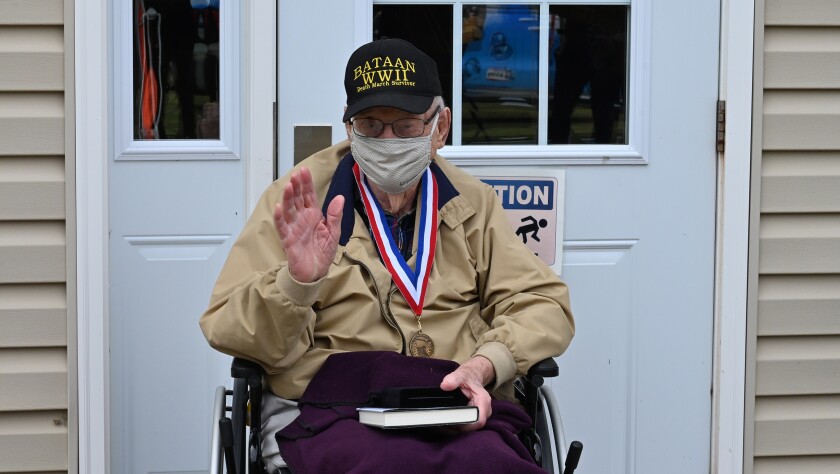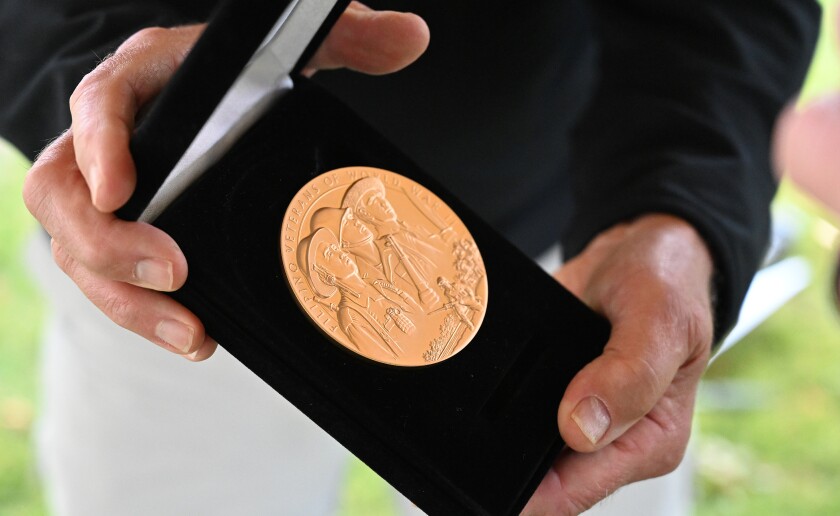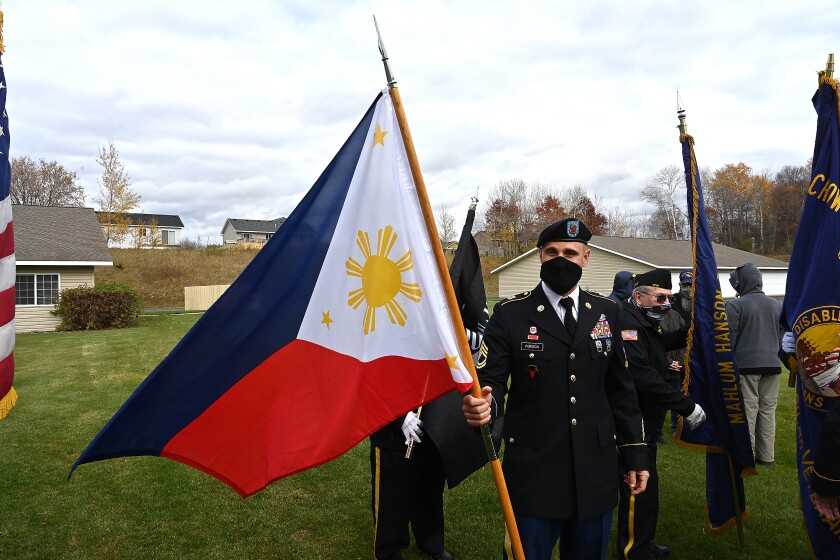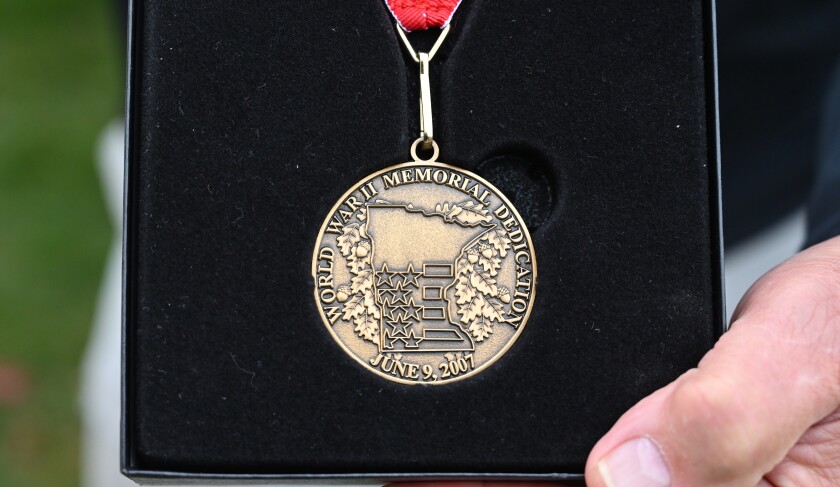Brainerd’s Walter Straka marched in treacherous conditions for about 65 miles over six days in the infamous Bataan Death March that began April 10, 1942.
Straka has told the story many times of the Bataan Death March, that he shouldn’t be alive, that he “should have been dead a thousand times.”
But he didn’t die, he is a survivor. And decades later, at age 100, Straka is Minnesota’s last surviving member of the Bataan Death March.
On Wednesday, Oct. 14, Straka was honored for his services during World War II with the prestigious Congressional Gold Medal and the Minnesota World War II Memorial Medallion.
ADVERTISEMENT
The ceremony honoring Straka was hosted through the Filipino Veteran Recognition and Education Project, Freedom Flight and the 194th Tank Regiment and took place outside of Edgewood Brainerd Senior Living in Brainerd, where Straka moved into in June from his longtime Brainerd home.
Straka, wearing a mask and a Bataan baseball cap, sat in his wheelchair as his son Paul Straka wheeled him outside for the ceremony. Five of Straka’s six children were in attendance: Gregory, Paul and Peter Straka and Marsha Kate Haaf and Sarah Porter; daughter Elizabeth Miles was unable to attend. Straka and his wife Cleta, who died in 2009, raised seven children. Their daughter Jane Straka died in 1976.
Colors were posted by the Veterans of Foreign Wars, the American Legion, Disabled American Veterans and the 194th Armor Battalion.
Retired Maj. Gen. Gerald Lang of the U.S. Army presented the award to Straka. The Congressional Gold Medal is an award bestowed by the U.S. Congress. It is the highest expression of national appreciation for distinguished achievements and contributions.

“What an honor it is for me personally to be able to honor you, to present this award,” Lang said to Straka. “I can tell you that I've given a lot of awards, and a lot of metals throughout my career. But I want you to know that there's certainly a real privilege and an honor to be able to present to Walt the Congressional Gold Medal. The Presidential Medal of Freedom, and the Congressional Gold Medal, are the highest civilian awards in the United States.
ADVERTISEMENT
“The Congressional Gold Medal seeks to honor those individuals or groups ... who have performed an achievement that has an impact on American history and a culture that is likely to be recognized as a major achievement in the recipient’s field long after the achievement. Well this is long after the achievement. From what I could find in my research as of 2019, only 167 people or groups of people have been awarded the Congressional Gold Medal.”
Recipients of the Congressional Gold Medal include George Washington, who was the first recipient 244 years ago, and also Charles A. Lindbergh, Thomas A. Edison, Robert Frost and Gen. Colin Powell. The youngest recipient was 11-year-old Roland Boucher of Vermont in 1941, it states on the United States House of Representatives’ “History, Art & Archives” website. Roland rescued five of his playmates who had fallen through the ice of Lake Champlain while ice skating, four of whom survived.

“I met Walt several times over the years when we've been up here during the Bataan reenactment march,” Lang said. “And even though this is really, I mean this is a really big deal. I'm sure Walt and your fellow comrades would say, ‘You know, we were just doing our jobs.’ Well you know what, what Walt and his fellow 16 million comrades, fellow soldiers, sailors, airmen and Marines did in World War II? They did their jobs. They stepped forward, they raised their right hand, they said, ‘Send me.’ And in doing their jobs they knew full well that when they signed on that dotted line, America was going to send you to the far reaches of the world and, in Walt's case, endure some of the worst humanities, the worst atrocities that humanity could offer. But Walt and his fellow comrades stepped forward, and put their lives at risk to defend the freedoms that we hold dear today. And that is why the veterans of World War II are called the greatest generation. And they forever will be called the greatest generation of American citizens.”
Lang then quoted Bernard De Linton: “We fight not for glory, nor wealth nor for honors; but only and alone we fight for freedom, which no good man surrenders but with his life.”
Lang then read the “Attention to Orders” before he presented Straka the gold medal, stating it stands for his intrepidity and indomitable courage against a brutal enemy in defense of the Philippines and the United States from Dec. 8, 1941 to Dec. 31, 1946.
Commissioner Larry Herke of the Minnesota Department of Veterans Affairs presented Straka with the Minnesota World War II Memorial Medallion.
ADVERTISEMENT

“You gave it your all,” Herke said to Straka. “We appreciate the efforts of everything that you've done and everything you've done since coming back home. You’ve been a great father, a great member of your community.”
Herke then made an announcement that Gov. Tim Walz proclaimed Oct. 14 as Walter Straka Day. The proclamation details Straka’s service in World War II.
Straka, along with 64 Brainerd men in Company A, 194th Tank Battalion, left Brainerd Feb. 10, 1941, as the world was already embroiled in war. They arrived in the Philippine Islands on Sept. 26, 1941, months before Pearl Harbor was attacked by the Japanese. They were stationed near Clark Field on the island of Luzon and were the first tank company in the Far East before World War II. They fought on Bataan, isolated and without supplies, until they were ordered to surrender. Bataan fell on April 9, 1942. The infamous Death March began April 10 with soldiers marching about 65 miles over six days. Those who didn’t perish on the march faced deplorable conditions as Prisoners Of War and would not be liberated until 1945.
Of the 64 men from the tank company who left Brainerd, three were killed in action and 29 died as POWs.
“I should have been dead a thousand times,” Straka said in a Brainerd Dispatch interview in November 2015. “That 91 days, I was in range of getting killed every minute.”
ADVERTISEMENT

Straka survived firefights isolated and trapped in a tank, he was all but paralyzed by a rifle butt to the spine during the death march and felt bullets splitting the air between his legs. He survived bouts with malaria and dysentery and was down to 89 pounds from starvation.
The proclamation stated Straka “dealt bravely with the nightmares of his experience, raised a family of seven, and has succeeded in life through hard work and determination. Walter is an exemplary citizen, an American role model.”
Congressman Pete Stauber released a statement about the Straka’s honor:
“Private Walter Straka is an American hero, who has inspired me and so many others throughout Minnesota with his unforgettable story of perseverance in the face of great adversity. What Walter Straka and his fellow soldiers of the Bataan Death March endured must never be forgotten or taken for granted. While we can never fully comprehend the pain and cruelty that Walter endured during the Bataan Death March, or in the days following, we know that our nation is a stronger one because of his courage and sacrifice. I am incredibly grateful for brave Americans like Walter, and it is very fitting that he has been awarded the U.S. Congressional Gold Medal this afternoon.”
Commander, First Battalion, 194th Armor of Brainerd, Lt. Col. Jacob Helgestad presented Straka with a book titled “Thunder on Bataan,” by Don Caldwell. Caldwell interviewed Straka about his experiences as part of his research for the book.

ADVERTISEMENT
Straka was born Oct. 24, 1919, and soon will be celebrating his 101 birthday. He was 10 years old when the Great Depression descended on the world. His family struggled to put food on the table and heat their home. Straka told the Dispatch in 2019, he envisioned himself to be a lawyer and intended to pursue that as a career, but his fateful decision to enlist for a short stint in the National Guard changed his life.
Family reaction
Paul Straka and Haaf, speaking on behalf of Straka’s children, said how much the award means to their father. Due to COVID-19 restrictions, Walter Straka was unable to embrace his family or socialize with any of the guests. Paul Straka said when he first told his father about the Congressional Gold Medal, the first thing he said was “Is it real gold?”
“This is a guy who came through the Depression,” Paul Straka said. “He is so proud and very humble.”
The siblings said growing up they never really knew what their father went through during the war, as he never talked about it. However, later in life, Walter Straka began to open up more and that is when they learned about his experience.
“The more you talk to him the more you learn and he just remembers things that are just incredible,” Paul Straka said. “He’s been through a lot. He was in Nagasaki two days after the bomb was dropped and then in Japan. ... I am at a loss for words.
“It's funny, though, he's (almost) 101 years old and of all the things he's seen in this world ... he admitted to me, ‘I've never seen a time like this with a pandemic and all this kind of stuff.’ For somebody like that with his background to say something like that it's like, we are in extraordinary times.”
Haaf said their father taught his children to enjoy good food and good wine. She said her father loved to cook and had food on the table everyday. Even today he still enjoys cooking.
Haaf also noted that part of her father’s determination on surviving the war was his faith. She said he prayed the rosary and was determined to make it home.
“He was a fun man,” she said. “We have so many good times and we would go places and try new things. He was almost open to new innovations and was always about moving forward.”
ADVERTISEMENT
JENNIFER KRAUS may be reached at jennifer.kraus@brainerddispatch.com or 218-855-5851. Follow me at www.twitter.com/jennewsgirl on Twitter.








